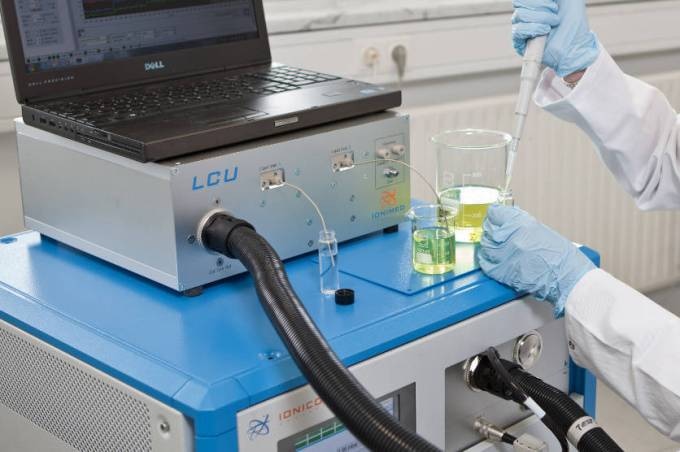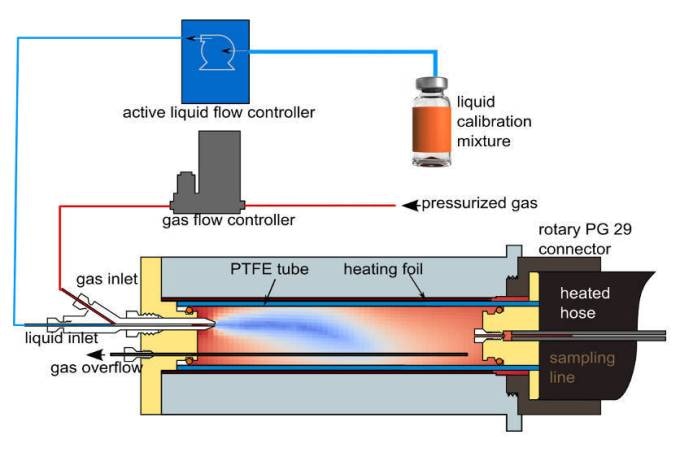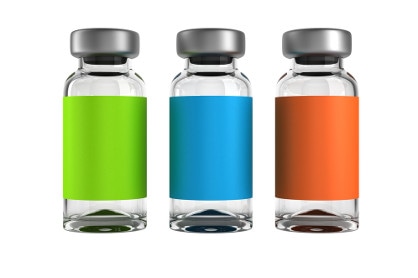The IONICON Liquid Calibration Unit (LCU) is capable of evaporating aqueous standards into a gas stream, resulting in a gas flow comprising of compounds at defined trace concentrations. It is possible to use this gas for precise calibration of trace gas analyzers over a wide range of concentrations and compounds.

Liquid Calibration Unit and PTR-MS.
An aqueous standard mixture can be prepared in a simple manner, and this can be done instantly for different compounds. IONICON’s LCU is a highly versatile and cost-effective calibration device for trace gas analyzers that can be used in many fields of research, such as biotechnology, food and flavor, petrochemical analysis, environmental research and breath-gas analysis.
- Concentrations from ppt to %
- Trace gas calibration using liquid standards
- Compatible with a wide range of compounds
- High versatility via user-defined liquid mixtures
Setup for Efficient Evaporation
The LCU uses an optimized evaporation technique that can be employed for semi-volatile and also volatile compounds. The key component is the purpose-built nebulizer: a gas and liquid flow mix at the tip of the nebulizer developing a fine mist. These micro-droplets are ejected into a heated (> 100 °C) evaporation chamber (see figure above), which helps in the evaporation process.

LCU Setup
This system has several advantages:
- The evaporation of compounds with a slow evaporation rate is improved by the enlarged surface area of the droplets.
- Compounds dissociated in water, such as acids (or bases), go through a decreasing pH value when the water evaporates from a droplet. This consecutively reduces the dissociation and results in a total evaporation of the compound.
Range of Compounds and Concentration
The LCU can be used for calibration of trace gas analyzers over a wide range of concentrations and compounds.
Solubility

For trace concentrations, an extremely low solubility of a compound in water is enough to develop an aqueous standard. As an example, this has successfully been attained for propofol, which has a solubility of just 0.12 g/l (25 °C) in water.
Vapor Pressure
The efficient evaporation mechanism allows calibration of compounds even with extremely low vapor pressures (i.e. semi-volatiles). This has been demonstrated in a successful manner for caffeine and indole (vapor pressure of just 1.6 Pa at 25 °C), which set the current benchmark.
The LCU has successfully been used with an expanding variety of compounds, including aldehydes, ketones, alcohols, terpenes, organic acids, amines and esters.
Concentration Range
The LCU has a dynamic range of 100. The resulting concentration in the gas phase directly relies on the concentration in the aqueous standard. This enables the exploration of concentrations up to ‰ or even % and down to the pptv range and below.
Specifications: LCU-s vs. LCU-a
The LCU is available in two versions:
The LCU-s (standard) comprises of one port for the dilution gas flow and one port for a liquid flow.
The LCU-a (advanced) has an additional liquid port, which can be used to connect pure water for maintaining the total liquid flow, thus keeping the sample gas humidity constant. Alternatively, it is possible to connect two liquid standards. Additionally, the LCU-a is provided with a mass flow controller (passivated by SilkoNert2000) in order to admix gaseous calibration standards or CO2.
| Equipment: |
Technical Specifications: |
| Dilution air flow: |
500 … 1000 ml/min |
| Gas-standard port |
0 … 100 ml/min (LCU-a only) |
| 1st Liquid port: |
0 … 50 µl/min |
| 2nd Liquid port: |
0 … 50 µl/min (LCU-a only) |
| Precision, accuracy: |
< 5%, depends on accuracy of liquid standard |
| Response time: |
< 1s (calibration step)
< 2 min. (change of aqueous standard) |
| Humidity range: |
up to 100% @ 40 °C |
| Weight & Dimensions: |
35 x 35 x 15 cm, 10 kg |